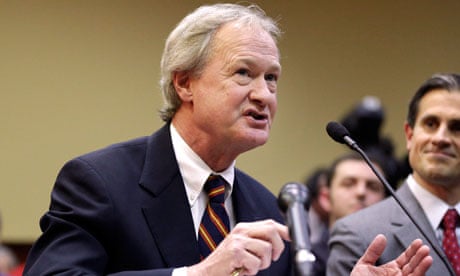We all know that are national politics are becoming more polarized: Democrats and Republicans are self-sorting into various regions and demographics, like north and south or urban and rural. There are few conservative Democrats and even fewer liberal Republicans. And yet few pay attention to state level politics, even though that's where much of US policy is made that Americans care about most.
That sales tax you're always complaining about? A local or state issue. That public school funding? Again, a local or state issue. Most of the gun control action after the Newtown tragedy has occurred only on the state level. At least 10 states where President Obama lost in November have actually relaxed their gun regulations. Meanwhile, at least five states he won will have made it more difficult to get a gun.
That's why it's such a big deal that Rhode Island governor Lincoln Chafee changed his political party, from unaffiliated to Democrat. He won the governor's mansion in 2010 after leaving the Republicans to be "unregistered". Over a decade ago, Chafee was appointed and then re-elected as a Republican to the US Senate in 1999 and 2000, after his father had been a Republican governor and senator for the better part of 40 years. His great-great grandfather and uncle were elected to office as Republicans. In other words, Chafee has a lot of blue Republican blood.
Chafee's changing party affiliations tells a larger story about how polarized our country has become. It wasn't too long ago that Republican governors roamed New England, even though Al Gore carried the whole region in a presidential election (except for New Hampshire) in 2000, and Democrats moved into governors' mansions in the former Confederate states that George Bush won all of. Only recently, Republican governors included John Rowland and later Jodi Rell in Connecticut, Paul Cellucci and Mitt Romney in Massachusetts, Lincoln Almond and Donald Carcieri in Rhode Island, and Jim Douglas in Vermont. Democrats had governors like Don Siegleman in Alabama, Roy Barnes in Georgia, Ronnie Musgrove in Mississippi, and Jim Hodges in South Carolina.
Those days are gone; all these states now have politicians of the other party for governor, which matches how their state voted in the prior presidential election.
There is one Republican governor left in New England: Paul LePage of Maine, and one Democratic governor in the old south: Mike Beebe of Arkansas. LePage only won 38% of the vote in 2010 and would have lost had his competitors not split the vote. Polling shows he's incredibly vulnerable in 2014. Beebe is required by term limits to step down in 2014, and Republicans are favored to win his seat.
If Republicans win Arkansas in 2014 and Le Page gets knocked off in Maine, it could be the final dent in the old coalitions of a Democratic south and Republican New England. Assuming no other changes in these regions' governor affiliations, it would be the first time no Republican governor held office in New England and no Democratic governor did so in a confederate state since the end of Reconstruction. In other words, we're basically back to civil war-era politics.
The inability for Democrats and Republicans to get elected to state-wide office in the south and New England, respectively, could have a significant impact on how these state governments operate. As I've mentioned before, and as has been well encapsulated by Abby Rapoport, state government has never been so polarized. The places where polarization is lowest are in the south and New England, in states like West Virginia – quite conservative and yet Democratic on the state level – and states like Rhode Island – liberal yet still with shades of Republicanism on the state level. It's increasingly clear that party affiliation is trumping ideology in these states, as it's been doing on the national level.
The policy ramifications of such a switch cannot be understated. Search Google for "Mike Beebe" and "veto", and the first links that appear are vetoes of abortion bans and voter identification laws that Republican state legislatures tried to pass. Do a search for "Paul LePage" and "veto", and you come up with vetoes for Medicaid expansions and cigarette bans. These governors are providing a check on legislatures that have already completed a full party conversion.
Once all the governors have switched and voters finish self-sorting, we could end with states that are very conservative and states that are very liberal. There will be little need for Democrats to play to the middle in formerly conservative New England states, and the same will be true for Republicans in the formerly liberal southern states. Whether that's good or bad I don't know, but it's going to make us wonder whether we can call our states politically united anymore.
